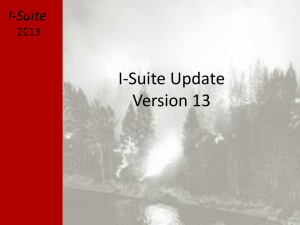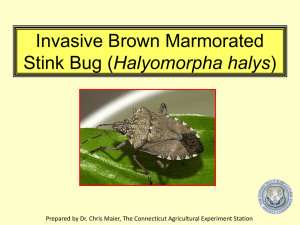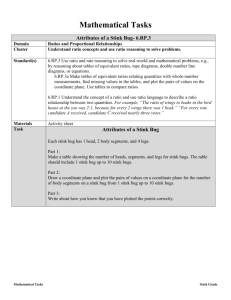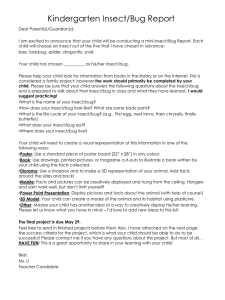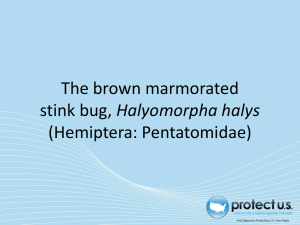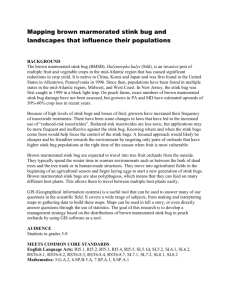Soybean Insects
advertisement
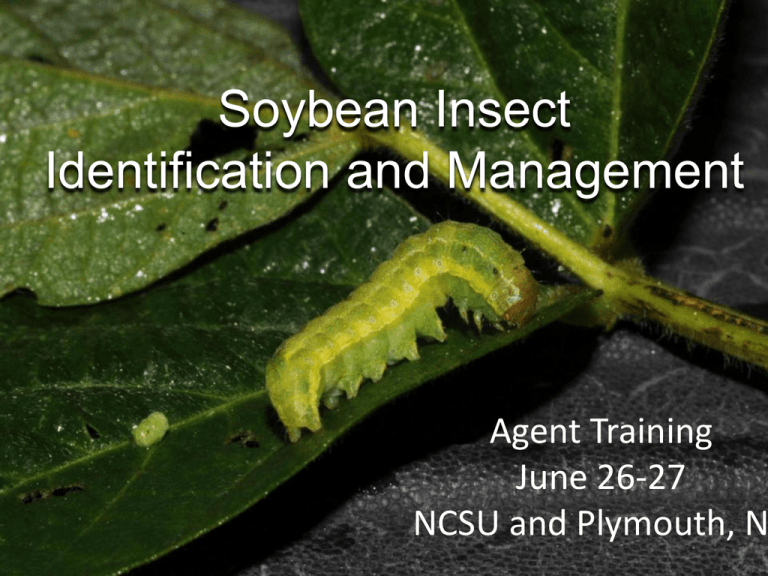
Soybean Insect Identification and Management Agent Training June 26-27 NCSU and Plymouth, N Plant Injury Chewing Piercing-sucking Insect Mouthparts Plant Injury Gall making Insect Vectors Injury vs. Damage Injury: harm or destruction on the host plant caused by the pest Damage: measurable loss of the host that affects the yield quantity, quality or aesthetics Old vs. New Injury Old New Economic Injury Level EIL: the lowest number of insects that causes economic damage EIL = 𝐶 𝑉𝐼𝐷𝐾 C = Cost of management per unit area V = market value per unit of product I = Injury units per insect per production unit; expressed as a proportion D = Damage per unit injury K = proportionate reduction in potential injury or damage Economic Threshold ET = the number of insects that triggers a management action Corn Earworm/Tobacco Budworm Thresholds now online! www.nccrops.com Will lead to Field Crop Entomology Webpage Link Click Soybean Insect Pests Click Corn Earworm Click CEW Threshold Calculator for Soybeans Sampling and Monitoring Methods Direct Sampling Transect Random Sampling Seedling Pests • • • • • • Thrips Grasshopper/Katydid Bean Leaf Beetle Cutworm Threecornered alfalfa hopper Lesser cornstalk borer Thrips Tobacco thrips predominate after planting, then soybean thrips Some Eastern flower thrips, very few Western flower thrips White Margined Burrower Beetle Grasshoppers • Most common in reduced till • Adults more difficult to kill Katydid Bean Leaf Beetle Cutworm Threecornered Alfalfa Hopper Check when beans are less than 10 inches tall Threshold is one per sweep Threecornered Alfalfa Hopper Injury Stem Borers • Lesser cornstalk borer • Dectes stem borer Lesser Cornstalk Borer Dectes Stem Borer Vegetative/Flowering Stage Pests (after seedling stage) • Defoliators – – – – – – – – – – – Corn earworm/tobacco budworm Armyworm complex Soybean looper (generally late-season) Green cloverworm (generally NOT a pest) Velvetbean caterpillar (generally late-season) Bean leaf beetle Japanese beetle Blister beetle Grape colapsis Spider mites Whitefly Corn Earworm/Tobacco Budworm Armyworm Complex Armyworm Complex Soybean Looper Green Cloverworm Generally NOT a pest Velvetbean Caterpillar Four pairs of prolegs Japanese Beetle • Beetles often congregate • Damage lacy • Usually sub-economic Blister Beetle Grape Colaspis Spider mites Whitefly Defoliator Thresholds • Vegetative stages – 30% defoliation • Two weeks prior to bloom and during pod-fill – 15% defoliation Vegetative/Flowering Stage Pests (after seedling stage) Piercing sucking pests –Kudzu bug –Brown stink bug –Green stink bug Kudzu Bug Kudzu Bug Stink Bug Complex Stink Bug Complex Green Stink Bug Nymph Brown Stink Bug Nymph Piercing/sucking like Kudzu bug However, stink bugs prefer and damage pods Common Beneficial Insects • • • • • • • Ladybird beetle Lacewings Minute pirate bug Bigeyed bug Nabids Spined soldier bug Praying mantis Ladybird Beetle eggs adult larva Common NC ladybird beetles Asian pink spotted pink spotted Green Lacewing adult larva eggs Minute Pirate Bug Bigeyed Bug Nabis (damsel bug) Spined Soldier Bug Praying Mantis Reproductive Stage Pests • Defoliators – Soybean looper – Armyworm complex – Bean leaf beetle • Pod-feeders – Corn earworm/tobacco budworm – Stink bug complex • Stem feeder – kudzu bug QUESTIONS?
